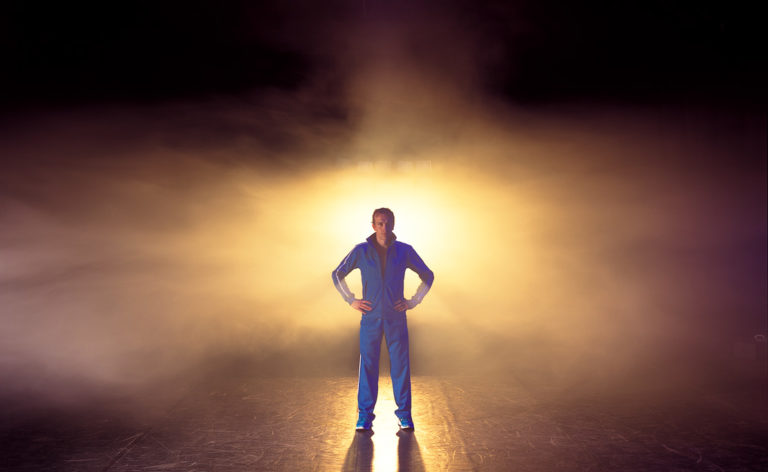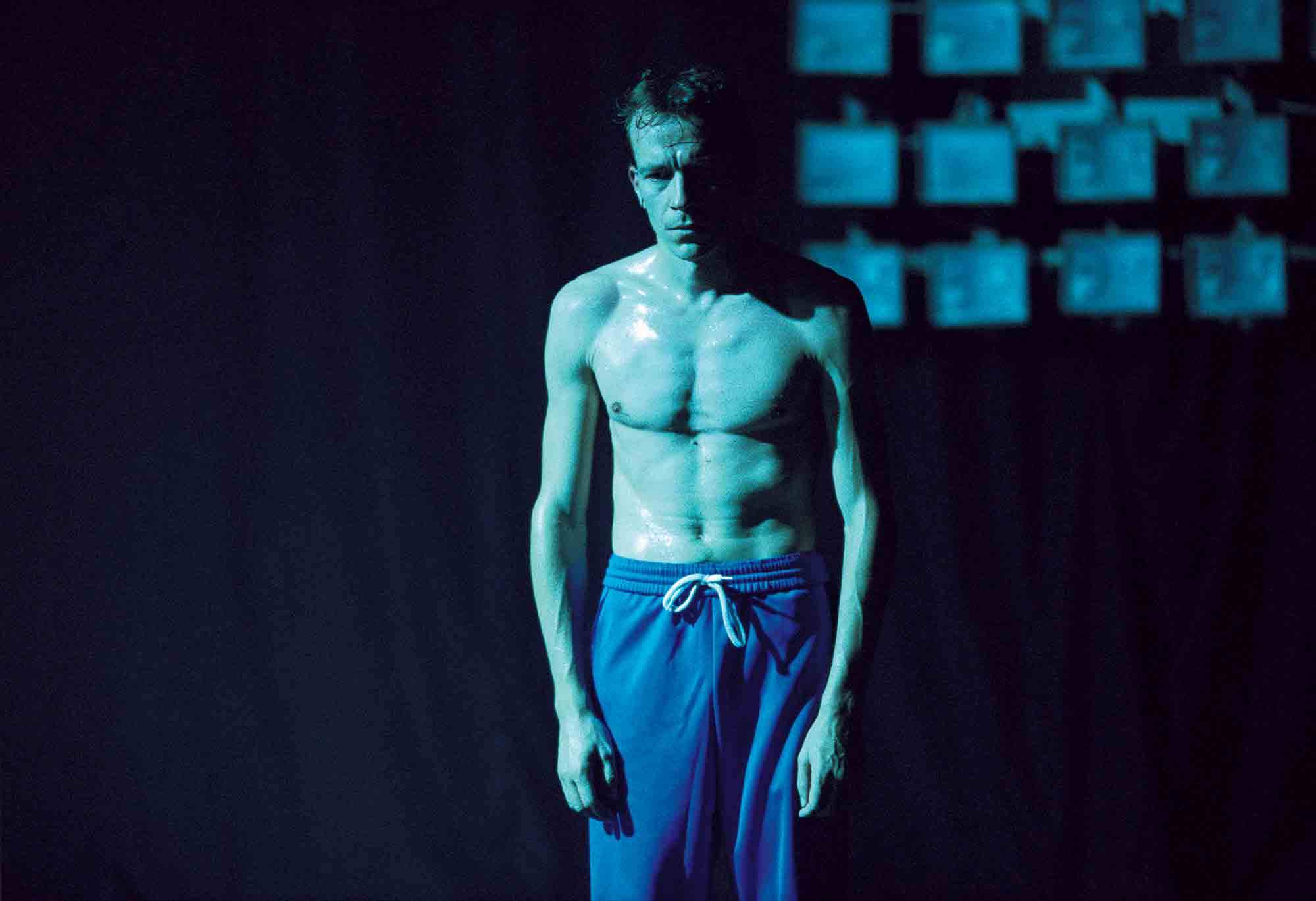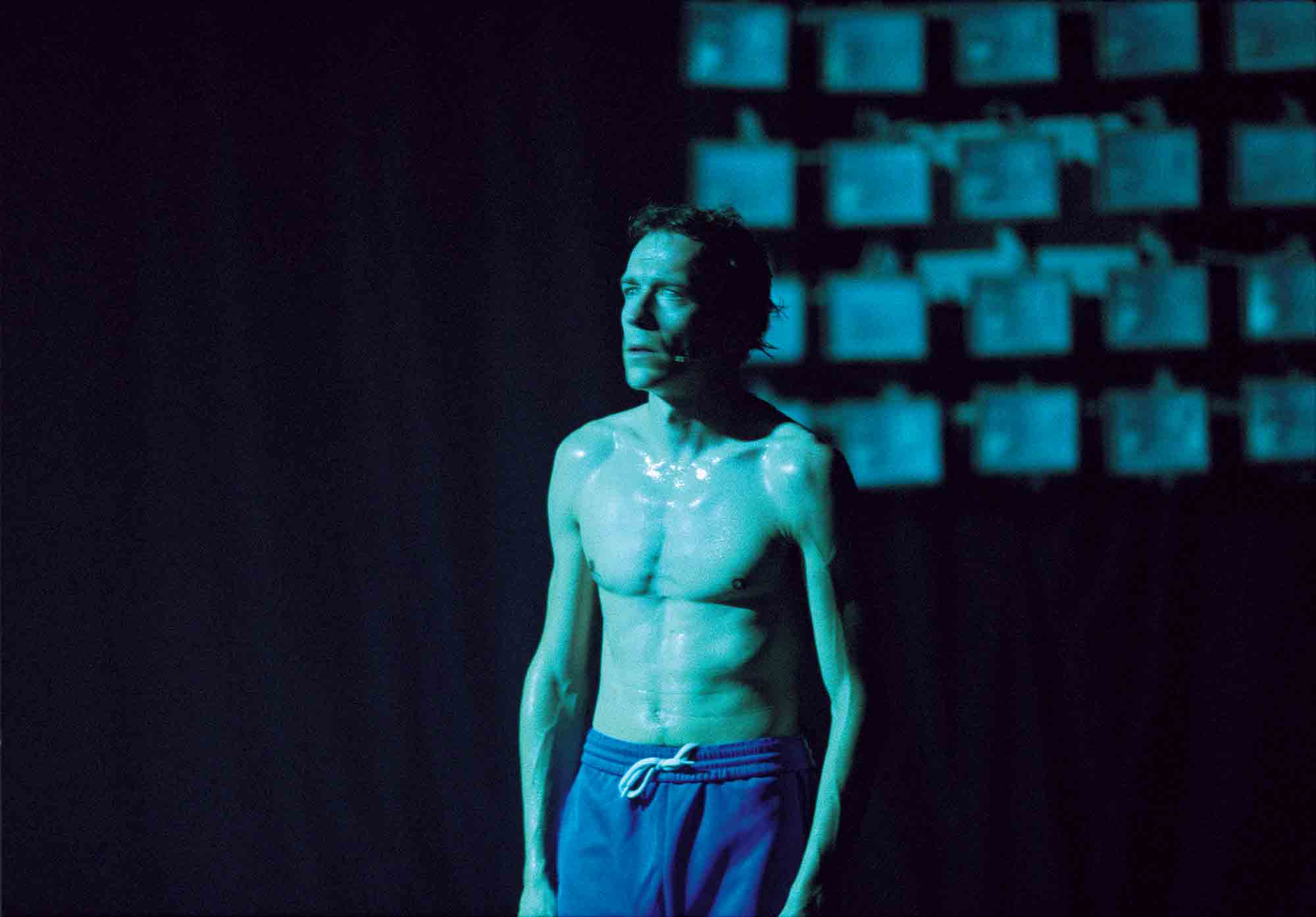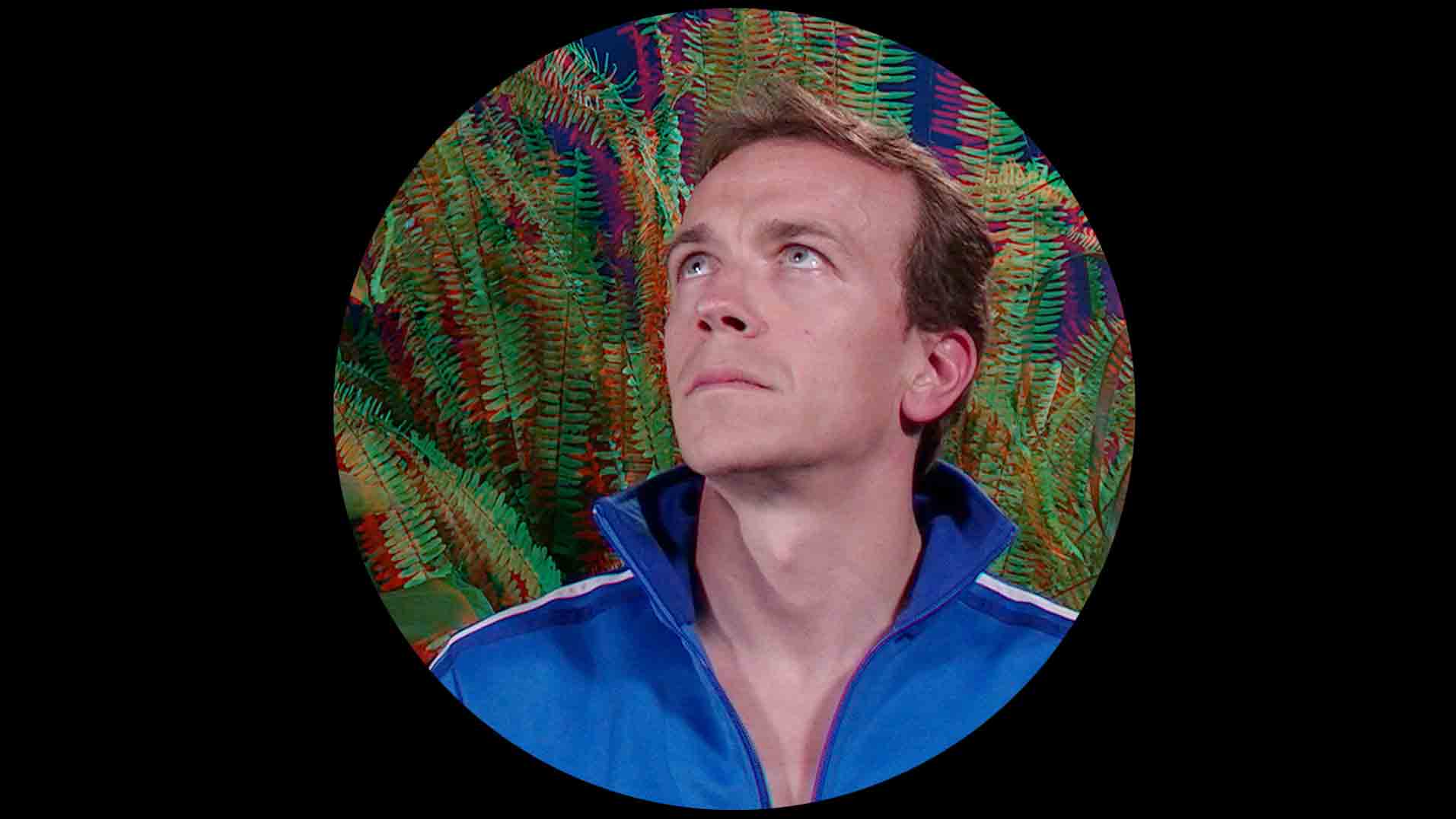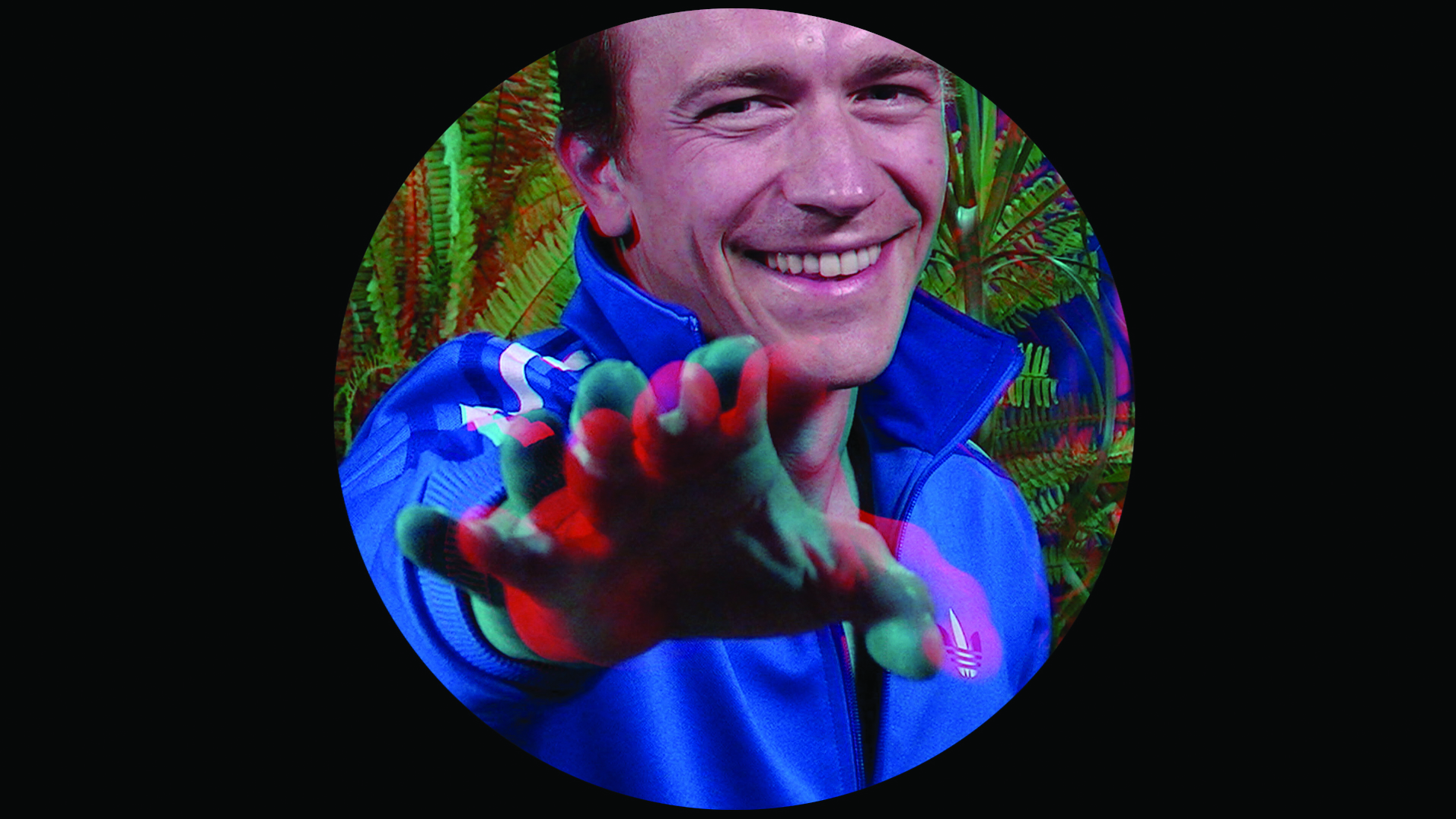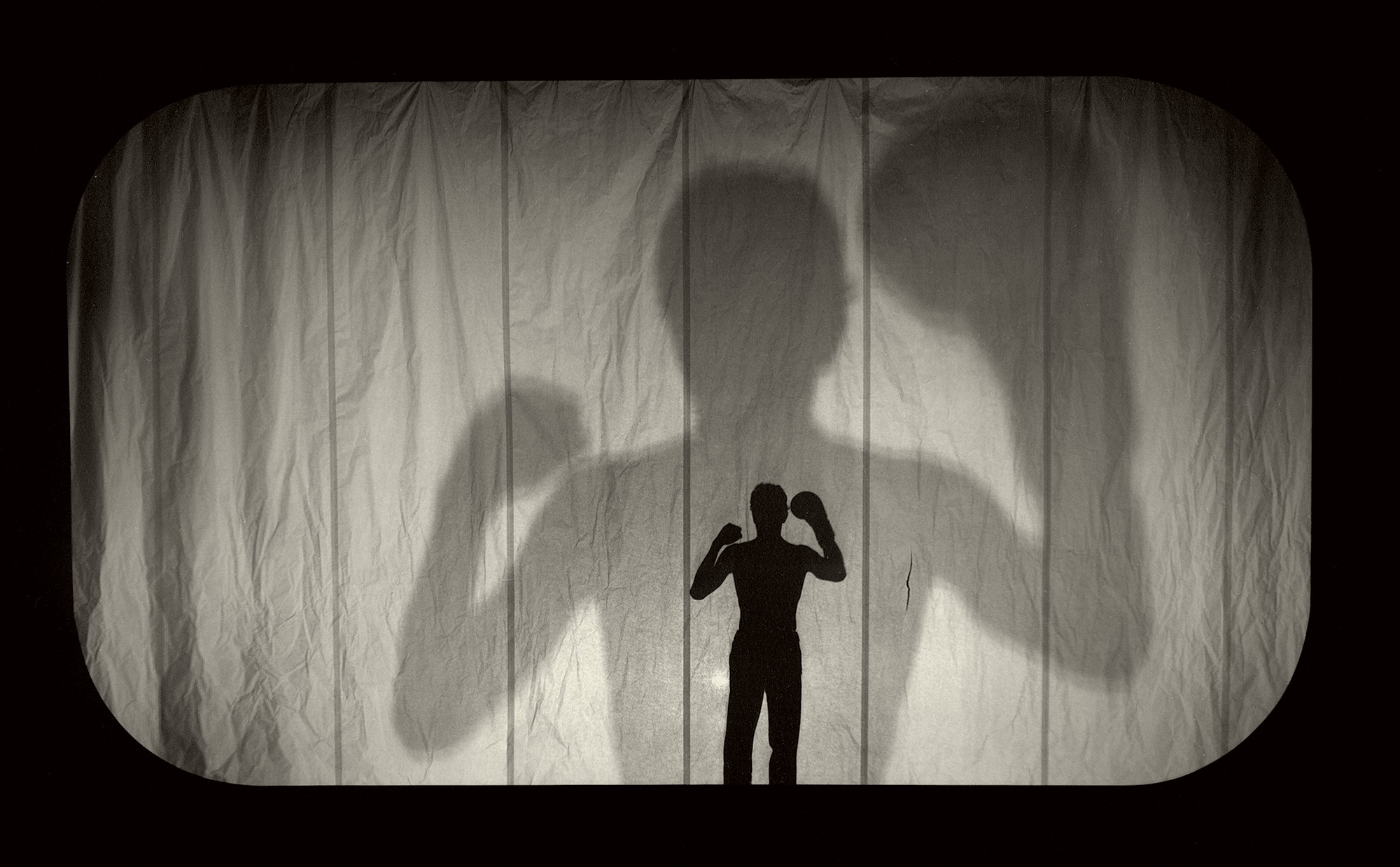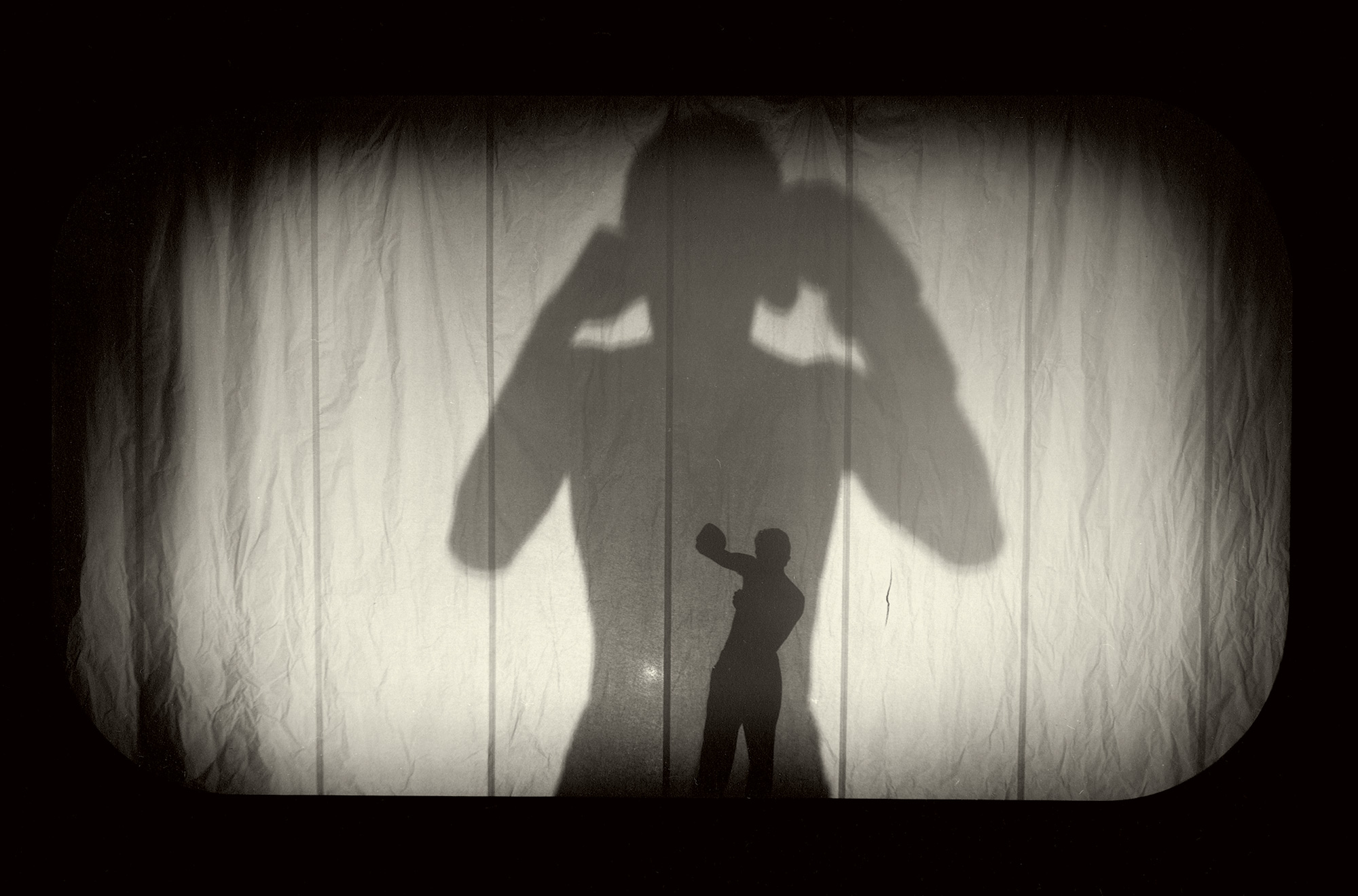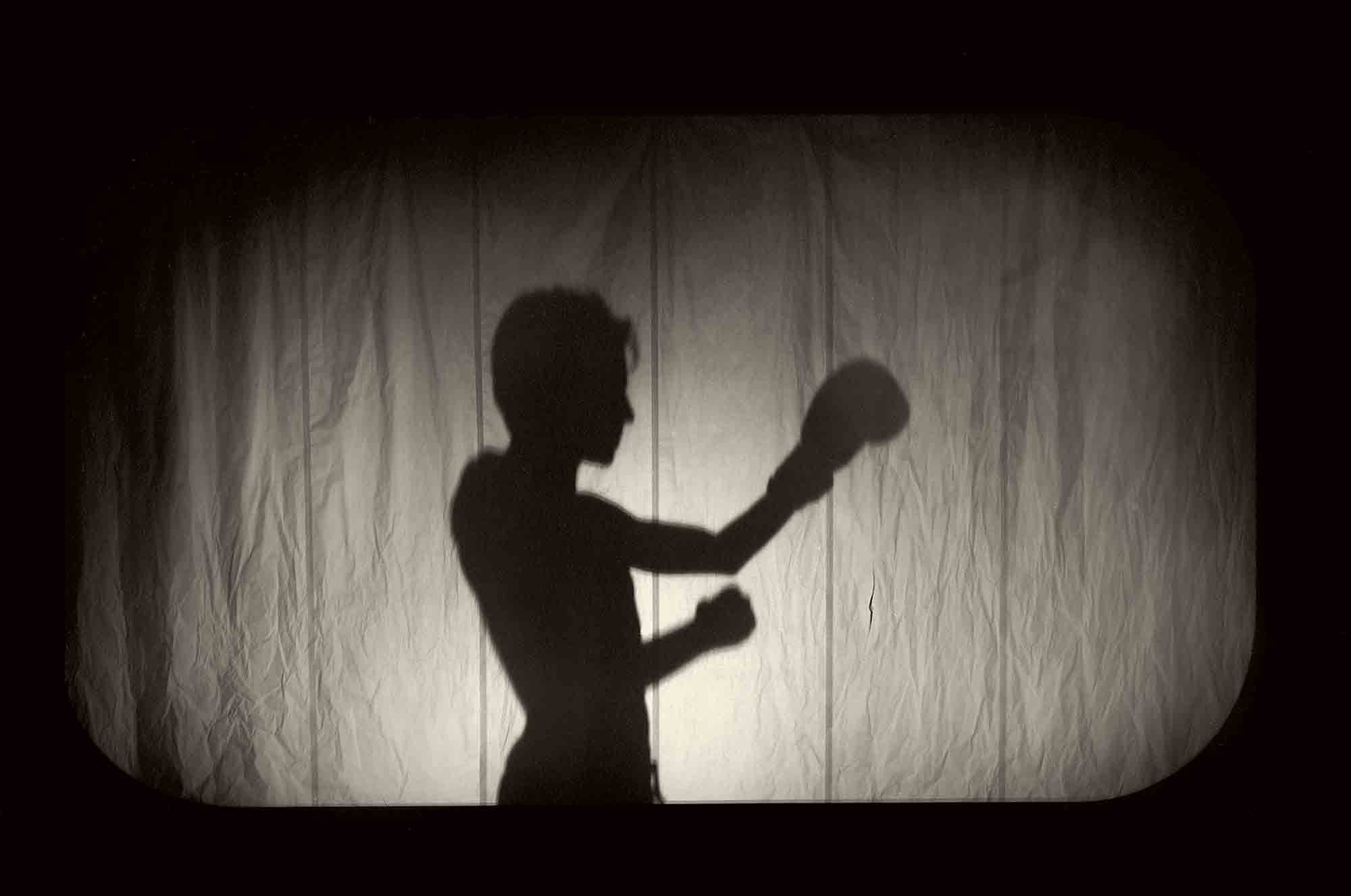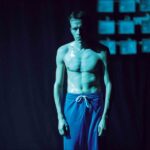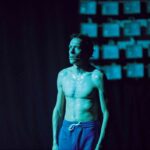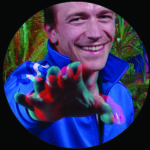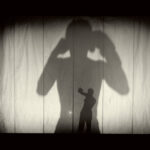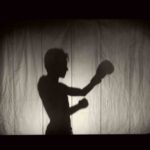- Concept: Luigi De Angelis and Chiara Lagani
- Dramaturgy and Costumes: Chiara Lagani
- Direction, Set and Lights: Luigi De Angelis
- Music: Mirto Baliani
- Video Images: ZAPRUDERfilmmakersgroup
- With: Lorenzo Gleijeses
- And with the voice of: Geppy Gleijeses
- Stage Movements: Marco Cavalcoli
- Scenography: Nicola Fagnani and Giancarlo Bianchini
- Promotion and Press Office: Paola Granato
- Logistics: Fabio Sbaraglia
- Administration: Marco Cavalcoli and Debora Pazienza
- Production: E / Fanny & Alexander
Year : 2014
“Since we all breathe all the time, it’s astonishing when someone tells you how and when you should breathe. It’s not like sleeping. Nor does his voice change or seem to withdraw. It’s there, speaking calmly, and so are you.” (David Foster Wallace)
“Blessed are those who have believed without having seen.” (Gospel of John)
Discorso Celeste stages a surreal and impossible dialogue between father and son, athlete and coach, player and guiding voice of the game. Starting from a video game logic based on the rhetoric of sports discourse and constructed on multiple levels, Lorenzo Gleijeses embodies a composite avatar grappling with a paradoxical question about faith. In the era of the “evaporation of the father,” is it still possible to believe? Suspended between virtual worlds, lost homelands, and artificial paradises, the son offers the father his mysterious answer.
After Discorso Grigio, dedicated to politics, and Discorso Giallo, dedicated to education, Discorso Celeste explores the realm of sports as a religious experience.
The text of the performance contains a quote from Visions of Jesus with Aphrodite by Giuliano Scabia, staged by Geppy Gleijeses in 2006. Lorenzo, in the role of Jesus, appeared on stage. We thank Scabia for his kind permission.
PAST DATES
- May 30, 2014 | Castrovillari (CS), Primavera dei Teatri
- June 15/16, 2014 | Turin, Teatro Gobetti, Festival delle Colline Torinesi
- March 28, 2015 | Ravenna, Teatro Rasi, Ravenna Viso-in-aria
- April 10/11, 2015 | Rome, Angelo Mai
- April 15, 2015 | Casalecchio di R. (BO), Teatro Laura Betti
[ph. ZAPRUDERfilmmakersgroup]
Fanny & Alexander | Discorso Celeste, by Angela Bozzaotra, http://nucleoartzine.com, Saturday, April 18, 2015
We propose an alternative dimension, within which the stage box has imploded and given rise to an indefinite space, a meeting of heterogeneous presences: sound, human, digital, and material. A scene transformed into a physical screen to be crossed and inhabited, asserting the indistinguishability between shadow and the human figure.
Such is the context in which we find ourselves immersed in the occupied space of Angelo Mai, attending Discorso Celeste #Sport/Religion, the third installment of the Discorsi performance cycle (2011) by the Ravenna-based research group Fanny & Alexander, preceded by Discorso Grigio (2012) on politics and Discorso Giallo (2013) on pedagogy.
The Discorsi project explores this linguistic construction in relation to six thematic fields (religion, politics, rights, religion, war, education), each associated with a color and a series of literary, artistic, and historical references; the performances are also accompanied by other types of scenic events, such as radio plays and concert performances, as seen in US – Tennis as a Religious Experience, an “oneiric tennis match” inspired by tennis player Agassi’s life and named after the book Infinite Jest by David Foster Wallace – presented at the 2014 Santarcangelo Festival. There, the performer Lorenzo Gleijeses played a tennis match against an invisible opponent, coached by his father Geppy (a well-known director and theater actor), present as the referee, while hypnotic techno-dance music by the brilliant Mirto Baliani, composer, sound designer, and Roman illustrator, played in the background.
In Discorso Celeste, we again find the father-son duo Gleijeses, Baliani’s original sound environment, and the performative and conceptual instance of sport as an existential metaphor. The dramaturgical apparatus created by Chiara Lagani is expanded, while the direction of Luigi De Angelis is enriched by numerous scenic effects that make the performance more abstract, giving it a rave-like aesthetic, enhanced by the inclusion of a 3D projection by ZAPRUDERfilmmakersgroup.
In the scenographic space fragmented by lighting, a virtual tennis match is played by Gleijeses the son, who follows the off-stage voice instructions of his father Geppy: his goal is to become a champion, and to achieve it, he must navigate a series of levels, corresponding to different skill tests in the typical video game format. The most difficult of these, the jump, becomes the dramatic focal point of the performance, taking on the connotation of a metaphor for the “leap of faith” in religious experience.
The mash-up as a compositional structure is evident both in the choreographic score, made up of movements from various sports (boxing, tennis, soccer, volleyball), and in the sound score: here, an assembly of sports commentary recordings alternates with stadium chants and religious hymns, as well as the live voice of Gleijeses the father, an immaterial presence often overshadowing the bodily presence of his son Lorenzo.
Among strobe lights, falls, and athletic exercises, a series of short scenes unfold, revealing a double conflict: the son’s struggle with the father/God and the inner conflict of the performer himself, who undergoes a physical and spiritual training process in preparation for the performance (as described in his dialogue with Chiara Lagani), questioning his past as an actor, particularly his portrayal of Jesus in the 2006 production of Visioni di Gesù con Afrodite by Giuliano Scabia, directed by Geppy Gleijeses, a passage of which is quoted in Discorso Celeste.
Rich with biographical, religious, and literary references, the work of Fanny & Alexander reveals a rupture: that of the individual in relation to the projections of the Self, which must be abandoned when facing the greatest trial – the leap into the dark – before which we are all equal, like a group of thirteen-year-old amateurs before playing their first important match. The duel against the salvific and simultaneously oppressive figure of the Father appears to be an indispensable condition for reuniting with him as the “Heavenly Father,” in what Gleijeses calls “My Paradise,” an otherworld with tropical palms and idyllic bird sounds, the final vision of the spectator, who is virtually touched by the 3D avatar’s hand, finally smiling.
The historic Ravenna-based research group plays a match in Discorso Celeste, too, walking the fine line between figuration and abstraction (the apex of which is represented by the presence of a violet light devouring the performer’s body), between the resistance of verbal text and its automatic rewriting through the mechanism of repetition, giving rise to a structurally ambiguous performance, where the spectator’s abandonment is often interrupted by the abrupt changes in tone and mood of the event, resulting in the shaking and unsettling of the vision, which the final appearance of the 3D “icon” leaves suspended with a question: After meeting and defeating the father, what will be the future of the son? We can only cheer for him, at the end of the discourse.
Fanny & Alexander, Fragments of Discorso Celeste, by Franco Cordelli, Corriere della Sera – Rome, April 16, 2015
When Mario Soldati became a critic, he announced that he would always distinguish between what one admires and what one loves. Thus, I would like to distinguish for Fanny & Alexander, on stage with Discorso Celeste. I love Fanny & Alexander. But love is an imprecise word, better said, I have sympathy; admiration is also imprecise; I admire, in Discorso Celeste, the last five minutes. The rest is like Canelupo Nudo by Maurizio Lupinelli, which I recently reported on. Even in Discorso Celeste there is a text, but it is just an appearance of a text, something elusive, insubstantial, empty. Theater descending from image-theater, which has exhausted its history for three decades, consciously takes refuge in appearances of gesturality. It would be better if it let itself go to death in the past: for example, by interpreting some illustrious text in the dynamics of images.
In Discorso Celeste, there is an idea of discourse on something, like in the previous performances of the same cycle (Fanny & Alexander works in cycles). The current theme is religion. It is understood as its metamorphosis into fetishism, totemism: from the sporting event. The champion for us is a saint, we deify him. Lorenzo Gleijeses presents himself in a tracksuit and invites us to stand up to listen to the national anthem. Then, behind a joke, he performs as an athlete (he was a footballer, now a boxer, always a Chinese shadow). After a pyramid-shaped triangle full of mist, in which he enters and exits, there are the admirable minutes. The champion appears in a circle, blessed by the father (the beautiful voice of Geppy Gleijeses), we worship him with red and blue glasses that make his figure three-dimensional, blessed among the birds’ song.
“My Obsessions as an Athlete,” by Luca Manservisi, Ravenna & Dintorni, March 26, 2015
On Saturday, March 28, at the Rasi Theater at 9:00 PM, as part of the “Ravenna viso-in-aria” season, Fanny & Alexander will bring Discorso Celeste to the stage, with Lorenzo Gleijeses, the music of Mirto Baliani, and the video images of Zaprouderfilmmakersgroup.
The performance, the third in the chronological order of the Discorsi project that the Ravenna-based company has been pursuing since 2011, is dedicated to sport and religion, staging a surreal and impossible dialogue between father and son, athlete and coach, player and guiding voice.
Starting from a video game logic played on the rhetoric of sports discourse and constructed on multiple levels, Lorenzo Gleijeses embodies a composite avatar engaged with a paradoxical question about faith. In the age of the “evaporation of the father,” is it still possible to believe? Suspended between virtual worlds, lost homelands, and artificial paradises, the son offers the father his mysterious answer.
LM: Lorenzo, sport and religion are two worlds very far apart in the collective imagination. Where did the suggestion to relate them come from? “Chiara Lagani and Luigi De Angelis’ initial idea comes from David Foster Wallace with Infinite Jest and the essay Tennis as a Religious Experience. He talked about the link between sport and religion, in the sense that the competitive athlete is today closest to what the mystic was in the past. He burns his desires and body for a goal beyond himself. A Roger Federer or a Maradona has the highest relationship with perfection compared to an average human being. This was the springboard we jumped from…”
LG: How did you work on this production? You recently brought US, inspired by Agassi’s biography, to Ravenna—how are these works connected? “US came after Discorso Celeste. In US, my gestures were more related to tennis, and I even had a racket as a prop. Here the work is more abstract. We created an alphabet of gestures, actions, and tics by observing those of athletes—Nadal’s backhand, Maradona’s way of dribbling, Cassano’s gestures, and so on. We immersed ourselves in this language that we learned through physical repetition.”
LM: Did you encounter difficulties while working on the athleticism required in the performance? “There were difficulties due to the complexity of the gestures and the demands of precision. We had a trainer with us who followed us for months to perfect the movements, and the most difficult part was the adaptation of the text to these gestures. Many of the most challenging aspects were about learning these movements.”
